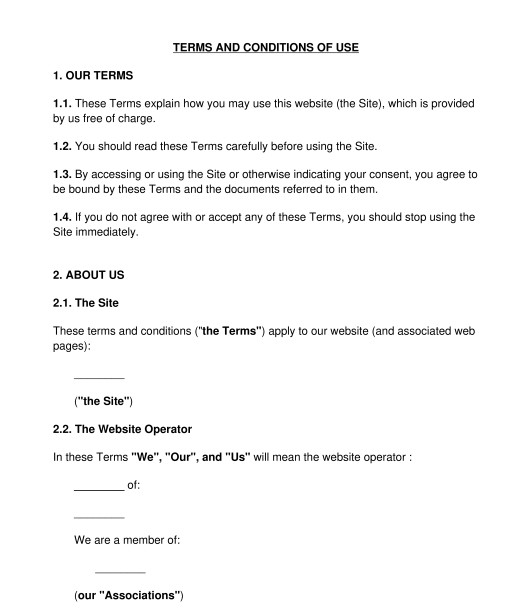 13/10/2025
13/10/2025

Answer a few questions and your document is created automatically.

Your document is ready! You will receive it in Word and PDF formats. You will be able to modify it.

 13/10/2025
13/10/2025
 Word and PDF
Word and PDF
 4 to 6 pages
4 to 6 pages
Website terms and conditions of use set out the basis on which an internet user can access and use a website in the United Kingdom.
Terms and conditions of use will address how a website may used. These will cover factors such as security, safety and intellectual property.
Terms and conditions of sale will constitute a contractual agreement. These will apply when a consumer purchases goods or services from an online retailer.
The purpose of an acceptable use policy is to set out the standards and rules which users of the website must comply with wherever they are using the website. This type of policy document is not legally binding.
The terms and conditions of use will endeavour to create a binding contract with the website user. The terms and conditions will often refer to and incorporate an acceptable use policy.
No. It is however good practice to have terms and conditions to limit a website operator's liability, as appropriate. Online safety laws are currently being tightened, so that website owners will have a duty of care to prevent the use of their services for criminal activity and to safeguard children.
It is intended that the terms and conditions of use will remain on the website indefinitely, but these should be updated at regular intervals. Usually, the terms and conditions will be reviewed and updated (where appropriate) at least annually.
Once the terms and conditions of use have been finalised, they should be displayed on a webpage of the website in an easily accessible location. It is best to obtain explicit acceptance of the terms and conditions from a website user (e.g. by asking a user to click an 'I accept' button before accessing the site).
It is possible for terms and conditions of use to constitute a binding legal contract. To maximise the chances of the terms and conditions being binding, a website operator must ensure that the website user has been informed of and has accepted the terms and conditions. Usually, this is achieved by asking a user to click a button to confirm that they accept and by ensuring that the terms and easily accessible.
A website operator will also need to hold other documents which should be read in conjunction with the terms and conditions of use, such as:
Terms and conditions of use should confirm:
The following legal provisions will be relevant to terms and conditions of use:
You fill out a form. The document is created before your eyes as you respond to the questions.
At the end, you receive it in Word and PDF formats. You can modify it and reuse it.
Website Terms and Conditions of Use - Sample, template
Country: United Kingdom